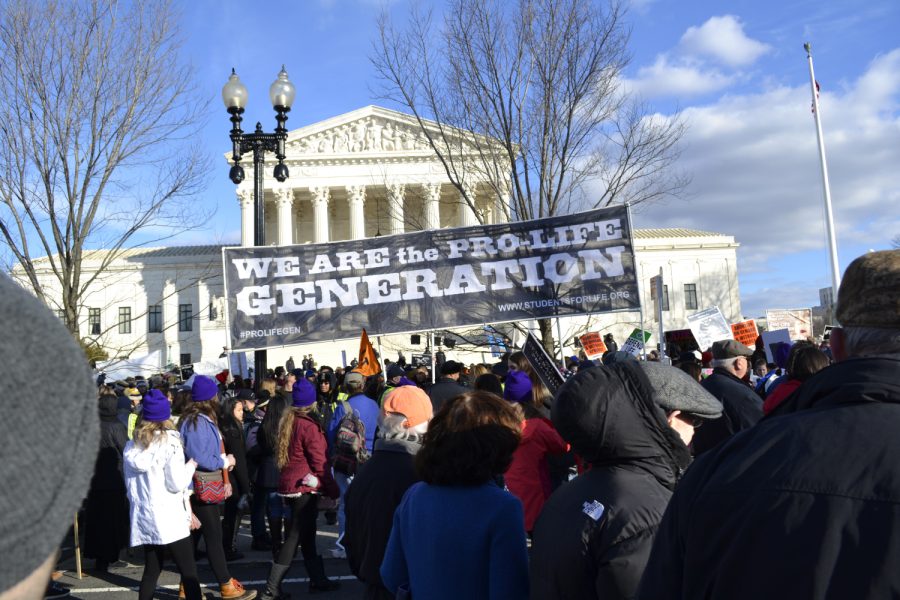Opinion | The hypocrisy of being both anti-abortion and pro-death penalty
“Pro-life” and pro-capital punishment movements are often seen as opposing, contradictory stances. While there is no direct correlation between those who are “pro-life” and pro-death penalty, these views do have one connecting point: an inability to empathize with others.
July 10, 2022
It appears the “pro-life” community believes life is precious in all circumstances unless society deems you undesirable.
Ties between those who consider themselves “pro-life” and pro-death penalty shouldn’t go unnoticed.
While “pro-life” advocates are not always pro-death penalty and vice versa, there is one striking similarity between the movements: a lack of empathy for others.
On April 12, Oklahoma Gov. Kevin Stitt signed into law one of the strictest limits on abortion in the country. This law made performing or receiving an abortion a felony in every instance excluding rape/molestation, incest, or in cases when harm to the pregnant person is inevitable if they continue their pregnancy.
This law supposedly affirms the majority opinion in Oklahoma that life begins at conception and should be protected in all circumstances.
Only weeks later, Oklahoma attorney general John O’Connor pushed for execution dates to be finalized for 25 death row inmates. If plans follow through as currently outlined, all 25 individuals will be executed sometime in the next 29 months.
Several of those incarcerated now facing execution have maintained their innocence. Although 78 percent of people recognize the concern that the justice system may execute innocent people, 60 percent of U.S. adults still favor the death penalty.
Under the current Republican majority, including Gov. Kim Reynolds, it remains unclear whether or not future Iowan laws and practices will begin to look as contradictory as Oklahoma’s.
The death penalty remains illegal and unused in Iowa except in federal circumstances. Recent legislative movements in 2018, 2019, and 2021 to reverse the 1965 decision have all failed. In 2006, the most recent poll done on public opinion of capital punishment, 66 percent of Iowa adults favored the death penalty.
Similar to capital punishment, the constitutional standing of abortion in the state remains unclear. On July 5, the Iowa Supreme Court referred Reynolds’ request to reconsider and strengthen Iowa abortion restrictions to a lower court. While abortion before 20 weeks remains legal for now, a 24-hour waiting period and other restrictions may soon become law.
Although it may be the case in Oklahoma and soon in Iowa, it is important to note that these views do not always go hand in hand.
Between 1977 and 2021, the number of people who favor the death penalty for homicide convictions and who also believe that abortion should be illegal in all circumstances has shrunk significantly. In the same time period, more people have begun to oppose the death penalty in homicide cases and are more in favor of abortion.
Some people argue the hypocrisy of the “pro-life” movement. In a Washington Post column, Cynthia Dalton calls out the “pro-life” community.
“If one calls oneself ‘pro-life’…yet is in favor of banning abortion; that person is not ‘pro-life,’ they are anti-abortion,” said Dalton. “If people who are anti-abortion only would just be honest and not claim to be ‘pro-life’ it would help these complicated situations be less intensely divisive.”
My pro-life and pro-death penalty peers have most consistently shown me how easy it is to stand behind moral convictions when their own safety isn’t on the line. This is far scarier and more telling of human nature than any singular political stance, including the ramifications of the “pro-life” ideology the U.S. faces in 2022.
The willingness to force one’s own moral compass onto others even when they face deadly consequences is where real societal danger lies within ideological systems like “pro-life,” pro-capital punishment movements.
No matter which side of the politics you align on, the ability to walk in other people’s shoes and consider their perspectives is a necessary component of responsible, equitable legislation.
Columns reflect the opinions of the authors and are not necessarily those of the Editorial Board, The Daily Iowan, or other organizations in which the author may be involved.



